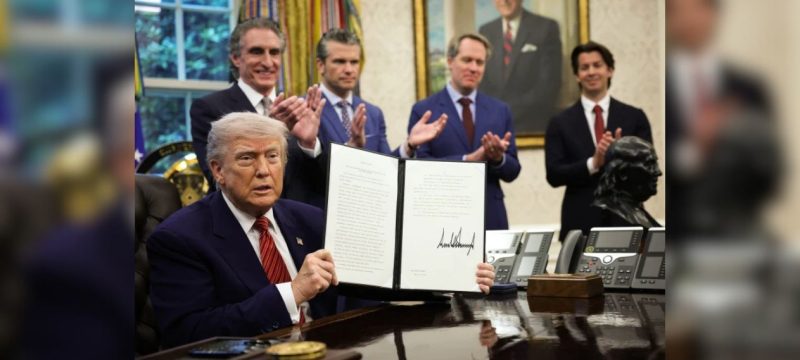US President Donald Trump has signed a set of executive orders designed to speed up the development of nuclear energy in response to increasing power demands from artificial intelligence and data centres.
The new directives instruct the Nuclear Regulatory Commission (NRC) — an independent authority — to accelerate its approval process for reactors and power plants, reducing licensing time from over a decade to just 18 months.
“This decision rolls back decades of excessive regulation,” stated Interior Secretary Doug Burgum, who also chairs the White House Energy Dominance Council, during the Oval Office signing event.
Read more: Court Blocks Trump’s Attempt to Revoke Harvard’s Enrollment of International Students
The orders represent a major shift in the country’s approach to nuclear energy and align with broader efforts by the Trump administration to boost domestic energy production, especially on federal land and military facilities. This follows Trump’s January declaration of a national energy emergency, warning that the power grid may not meet the soaring energy demands of AI infrastructure.
According to a senior White House official, the Department of Defense is expected to play a key role in commissioning and installing reactors on military bases to support energy security.
The executive orders also include instructions for the Departments of Energy and Defense to jointly pursue nuclear plant development, assess the NRC’s organizational structure, and revive domestic uranium mining and enrichment — sectors where the U.S. has fallen behind in recent decades.
Industry stakeholders reacted positively. Joseph Dominguez, CEO of Constellation Energy, welcomed the reforms, saying, “We waste time on unnecessary approvals instead of addressing real issues.”
Historically, the U.S. nuclear approval process has been long and complex, driven by past disasters like Chernobyl and Three Mile Island, which led to tighter regulations and greater public caution. Critics warn that easing these regulations could jeopardize safety.
Former Energy Secretary and nuclear physicist Ernest Moniz expressed concern, warning that weakening the NRC’s autonomy might lead to rushed deployment of untested technologies without proper risk evaluation. “One serious accident could bring back stricter rules and stall progress for years,” he noted.
Trump’s policy is also aimed at encouraging investment in emerging reactor types, especially small modular reactors (SMRs), which are touted as quicker and less expensive to build. Yet economic challenges persist: NuScale Power, the only firm with an NRC-certified SMR design, cancelled its project in 2023 due to budget overruns and competition from cheaper gas.
Additionally, the most recent reactor project — Vogtle Unit 4 — faced delays and went $16 billion over budget, reflecting the financial uncertainties of nuclear development.
To address these concerns, the administration plans to expand the Department of Energy’s Loan Programs Office to support nuclear projects declined by commercial lenders. However, this office has also seen staff reductions under Trump’s own earlier budget cuts.
Though the Trump administration has generally championed fossil fuels, this pivot toward nuclear reflects a growing bipartisan consensus. While Republicans highlight national energy security, some Democrats support nuclear for its zero-emissions potential. Still, environmental groups remain cautious, citing unresolved issues around radioactive waste, reactor safety, and long-term cost efficiency compared to renewable energy.









